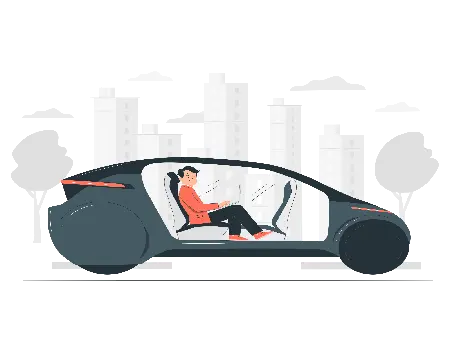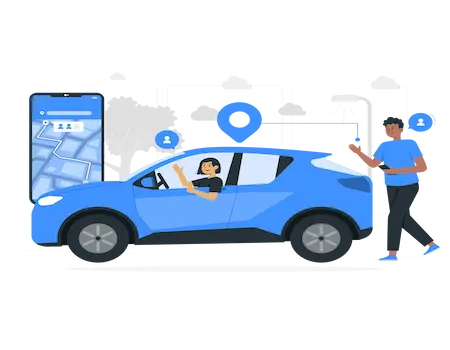How AI is Changing the Automotive Industry
The AI and Automotive Industry, frankly, as important as it is, took me time and effort, so I hope that I have touched through this article on all aspects, and for this I have divided the topic into 6 sections:- Introduction to AI in Automotive: Understanding the Basics.
- AI in Self-Driving Cars: The Future of Autonomous Vehicles.
- AI in Car Manufacturing: Optimizing Efficiency and Quality.
- AI in Car Safety and Security: Protecting Drivers and Passengers.
- AI in Car Entertainment and Convenience: Enhancing the Driving Experience.
- The Impact of AI on the Automotive Industry: Opportunities and Challenges.
Introduction to AI in Automotive: Understanding the Basics
Artificial intelligence (AI) is a rapidly growing field that has the potential to revolutionize the automotive industry. At its core, AI is all about creating machines that can perform tasks that would typically require human intelligence, such as learning, problem-solving, and decision-making. In the context of cars, this means that AI can be used to improve everything from fuel efficiency and safety to performance and comfort.The development of autonomous vehicles
One of the key ways that AI is being used in the automotive industry is through the development of electric cars and autonomous vehicles. These cars use a combination of sensors, cameras, and machine learning algorithms to navigate the road and make decisions without human input. This technology is still in the early stages of development, but it has the potential to transform the way we think about transportation. Self-driving cars could reduce the number of accidents caused by human error and make it possible for people who are unable to drive, such as the elderly or disabled, to gain more independence.Advanced Driver Assistance Systems (ADAS)
Another area where AI is being used in the automotive industry is in the development of advanced driver assistance systems (ADAS). These systems use sensors and cameras to detect potential hazards on the road and alert the driver to take action. They can also take over certain driving tasks, such as braking or steering, to help prevent accidents. This technology is already being used in some cars on the road today, and it is expected to become increasingly prevalent in the years to come.AI in Self-Driving Cars
Artificial intelligence (AI) is set to revolutionize the automotive industry in the coming years, with self-driving cars being one of the most exciting and transformative applications.Self-driving cars are vehicles that are capable of sensing their environment and moving safely without the need for human input. They use a combination of sensors, cameras, and AI algorithms to navigate roads, avoid obstacles, and make decisions. The technology is still in the early stages of development, but it has the potential to change the way we think about transportation.
The Future of Autonomous Vehicles
The first self-driving cars were developed in the early 2000s, but it wasn't until the 2010s that the technology began to mature. In 2012, Google's self-driving car project, now known as Waymo, logged over 300,000 miles on public roads. In 2015, Tesla released its first semi-autonomous car, the Model S, which was capable of steering and braking on its own. Since then, many other automakers and tech companies have jumped into the self-driving car game, including Uber, Lyft, and General Motors.Self-driving cars promise to bring many benefits to society, including increased safety, reduced congestion, and improved mobility for people who are unable to drive. However, there are also many challenges that need to be overcome before self-driving cars can become a reality. For example, the technology is still in the early stages of development, and there is much work to be done to make sure that self-driving cars are safe and reliable. Additionally, there are many legal, ethical, and societal issues that need to be addressed, such as how to handle accidents, who is liable, and how to ensure privacy and security.
AI in Car Manufacturing: Optimizing Efficiency and Quality
Artificial Intelligence (AI) is revolutionizing the way cars are manufactured. By using machine learning algorithms and computer vision, car manufacturers are able to optimize production processes and improve the overall quality of their vehicles.Robotic automation
One of the most significant ways that AI is being used in car manufacturing is through the use of robotic automation. Robotics and AI can work together to perform tasks that are too dangerous or difficult for humans to do, such as welding, assembling, and painting. This results in increased efficiency and accuracy, as well as decreased labor costs.Predictive maintenance
Another way that AI is being used in car manufacturing is through predictive maintenance. By using data from sensors and other sources, AI algorithms can predict when a machine or component is likely to fail. This allows manufacturers to take preventative action before a failure occurs, which can save time and money, as well as avoid costly downtime.Quality control
AI is also being used in quality control. Computer vision and machine learning can be used to inspect vehicles at various stages of production. This can help identify defects and issues early on, which can save time and money, as well as improve the overall quality of the vehicles. Additionally, AI algorithms can be trained to identify patterns in production data that humans may not be able to see, which can help identify and solve problems that might otherwise go unnoticed.In summary, AI is playing a significant role in the car manufacturing process. By using AI, car manufacturers are able to optimize production processes, improve the overall quality of their vehicles, and reduce labor costs. As the technology continues to evolve, it is likely that the use of AI in car manufacturing will become even more widespread and essential for success in the industry.
AI in Car Safety and Security: Protecting Drivers and Passengers
The use of artificial intelligence (AI) in car safety and security is a rapidly growing field. Advancements in technology have allowed for the development of sophisticated systems that can detect and prevent accidents before they happen.Detect potential hazards on the road
One of the key applications of AI in this area is the use of sensor data to detect potential hazards on the road. For example, cameras and lidar sensors can be used to detect obstacles in the car's path and alert the driver to take action. Additionally, AI algorithms can be used to analyze data from these sensors to detect patterns that indicate a potential accident.Improve the performance of existing safety systems
Another important application of AI in car safety and security is the use of machine learning algorithms to improve the performance of existing safety systems. For example, AI can be used to optimize the performance of anti-lock brakes, traction control, and stability control systems. Additionally, AI can be used to improve the accuracy of sensors such as radar and lidar, which are used in advanced driver assistance systems (ADAS) like lane departure warning and automatic emergency braking.Detecting and preventing hacking attempts
AI is also being used to improve the security of cars by detecting and preventing hacking attempts. Machine learning algorithms can be used to analyze data from the car's network to detect abnormal behavior and prevent unauthorized access to the car's systems. Additionally, AI can be used to improve the performance of encryption algorithms used to protect the car's data and prevent data breaches.Overall, the integration of AI in car safety and security is expected to have a significant impact on the automotive industry. It will not only improve the safety of cars but also increase the performance of existing systems and enhance the overall driving experience for the end user.
AI in Car Entertainment and Convenience: Enhancing the Driving Experience
AI in car entertainment and convenience is an area of the automotive industry that is rapidly advancing. With the integration of AI technology, cars are becoming increasingly smart and able to understand and respond to the needs of drivers and passengers. One of the most exciting applications of AI in this area is in the realm of infotainment systems. These systems use AI algorithms to learn the preferences of drivers and passengers, and to make personalized recommendations for music, podcasts, and other media.Improve the navigation experience
Additionally, AI can be used to improve the navigation experience, providing real-time traffic updates, and suggesting alternate routes to avoid congestion.Another area where AI is being applied in car entertainment and convenience is in the realm of voice assistants. These systems use natural language processing and machine learning to understand and respond to voice commands. With the help of AI, drivers can control the car’s climate, media, and navigation systems without ever having to take their hands off the wheel. Additionally, AI-powered voice assistants can also make phone calls, send text messages, and even perform online searches.
Finally, AI is also being used to improve the safety and security of cars. For example, AI can be used to monitor the driver for signs of drowsiness or distraction and alert them to take a break. Additionally, AI can be used to detect and respond to potential collisions, and to automatically engage the brakes or steer the car to avoid an accident. As AI technology continues to advance, we can expect to see even more innovative applications of AI in car entertainment and convenience in the coming years, making driving safer, more enjoyable, and more convenient.
Impact of AI on the Automotive Industry: Opportunities and Challenges
The impact of artificial intelligence (AI) on the automotive industry is significant, as it has the potential to revolutionize the way cars are designed, manufactured, and used. One of the main opportunities of AI in the automotive industry is the ability to optimize efficiency and quality in car manufacturing. By using AI algorithms, car manufacturers can analyze vast amounts of data to identify patterns and trends, which can be used to improve production processes and reduce costs.The ability to enhance the driving experience
Another opportunity of AI in the automotive industry is the ability to enhance the driving experience. By integrating AI-powered systems into cars, manufacturers can offer advanced features such as voice recognition, natural language processing, and advanced navigation systems. These features can make the driving experience more convenient and enjoyable, increasing customer satisfaction and loyalty.Challenges
However, there are also challenges that come with the implementation of AI in the automotive industry. One of the main challenges is the need for significant investments in research and development, as well as the need for specialized personnel and expertise. Additionally, there are also concerns about data privacy and security, as well as the potential for job loss in the manufacturing and driving sectors.Despite these challenges, the potential benefits of AI in the automotive industry are too significant to ignore. With the right approach and strategies, the industry can harness the power of AI to create safer, more efficient, and more enjoyable cars for customers around the world.
In conclusion, the integration of artificial intelligence in cars is revolutionizing the automotive industry in many ways. From self-driving cars to improved safety systems, AI is shaping the future of transportation. However, it also brings new challenges and ethical considerations, such as job displacement and data privacy. As technology continues to advance, it is important for the industry to consider these issues and work towards finding solutions. Overall, the role of AI in cars has the potential to greatly enhance the driving experience and make our roads safer, but it is important to approach it with caution and consider the impact it may have on society as a whole.


.png)
.webp)


